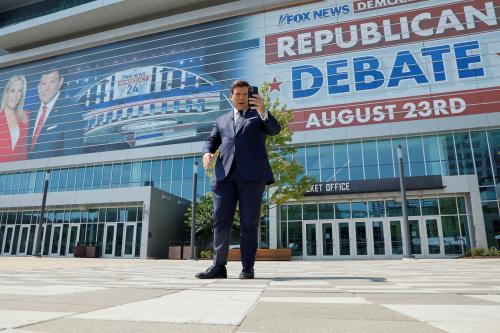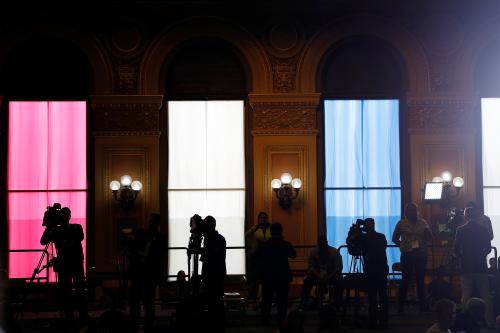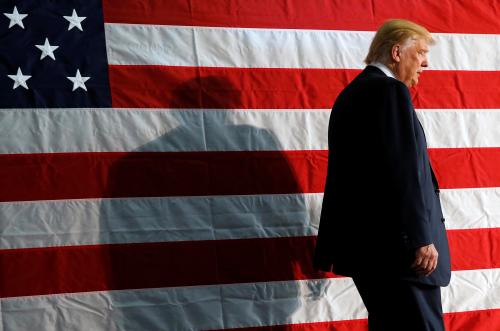As the eight candidates who qualified for the first Republican primary debate convened in Milwaukee, two questions loomed over the proceedings. First, would anyone begin to emerge as the principal challenger to Donald Trump, or would the 2024 campaign repeat the 2016 failure of the anti-Trump forces to coalesce around a single alternative? Second, if 2024 is to be different, who will be Trump’s main opponent?
Six months ago, the answer seemed clear — Ron DeSantis, who had won a landslide reelection as governor of Florida and whose attacks on all things “woke” seemed to be resonating with his party’s base. But since the announcement of his presidential candidacy, little has gone right for DeSantis. Missteps on key issues, lackluster performances on the stump, and effective tactics by the Trump campaign have combined to diminish support for DeSantis, and Trump’s once-narrow lead over him has ballooned to more than 41 points nationally and a smaller but still formidable 26 points in Iowa.
DeSantis’s decline has opened the door for other candidates vying to become Trump’s leading opponent. Broadly speaking, they have adopted one of three paths to success. Some, such as DeSantis and entrepreneur Vivek Ramaswamy, have remained close to Trump in both policy and rhetoric. They offer the Republican electorate Trumpism without the baggage of January 6, multiple lawsuits, and character flaws that repel a substantial portion of the electorate. Others — former New Jersey Governor Chris Christie and former Arkansas Governor Asa Hutchinson — have adopted the opposite path, vigorously criticizing Trump on multiple fronts and promising the electorate something completely different.
A third group — former Vice President Mike Pence, South Carolina Senator Tim Scott, and former South Carolina Governor Nikki Haley — has tried to split the difference, combining praise for Trump’s achievements while criticizing the most controversial aspects of his record. Thus far, Pence’s campaign has been hobbled by the anger of Trump supporters who see his refusal to halt the certification of Joe Biden’s election as a betrayal. By contrast, Scott has been able to stay above the fray, running a positive campaign featuring his compelling life story and distinctive role as the only Black candidate in the race. Haley also is distinctive as the only woman in the race and as a candidate who can speak with authority about international affairs — attributes that have not gotten her much attention up to now.
Did anything happen in the debate to change this picture?
To the surprise of no one, Chris Christie was the most forceful in his denunciations of Donald Trump’s conduct and may have created space for other candidates to move in his direction. At the same time, he had little distinctive to say about the other major issues and seems unlikely to have raised the low ceiling on his potential support.
Governor Burgum of North Dakota and former Governor Asa Hutchinson are decent and capable men who had difficulty even qualifying for the debate and are barely registering in the polls. They said nothing that seems likely to move sentiment in their favor, and Hutchinson’s references to his accomplishments during the Bush administration strengthened the impression that he is a man of his party’s past, not its future.
At the other end of the spectrum, the 38-year-old Ramaswamy emerged as the candidate of the New Right — the rising force within the conservative movement that rejects the Reagan model as unresponsive to the ills of contemporary American society. In a telling exchange, Mike Pence invoked the goodness of the American people and announced in Reaganesque tones that America’s best days lie ahead. Ramaswamy responded by saying that it isn’t morning in America anymore and that our dark times require nothing less than an American revolution (an unconscious echo of Bernie Sanders’ argument in a very different ideological direction).
Ramaswamy relentlessly attacked everyone else on the stage as bought and paid for creatures of their Super Pacs — and by staking out extreme positions on virtually every issue. This placed him at the center of the debate, but only because most other candidates rose to the bait and responded to his provocations. Clearly, their campaigns had decided that the candidates needed to engage him to stem his surge in the polls. But doing so may have backfired. The Republican primary electorate will have to decide whether to place their hopes for victory in the hands of someone with no experience in elective office or foreign policy and none of the personal maturity that the office of the presidency requires.
Mike Pence emerged as Ramaswamy’s principal antagonist, and nearly his equal in aggression. He vigorously defended the record of the Trump-Pence administration and often interrupted Ramaswamy to contest his claims. Despite this, Pence managed to convey experience and a measure of gravitas. In response to questions from the moderators, all the other candidates praised his role on January 6, some grudgingly, others (such as Chris Christie) enthusiastically. Were it not for the resentment that his actions stirred among pro-Trump Republicans, he might well be a leading candidate. Even so, he probably did himself some good during the debate.
Fighting to recover his position as Trump’s leading competitor, Ron DeSantis turned in a focused, well-organized performance. He knew what he wanted to say and said it crisply. At the same time, he evaded several direct questions from the moderators and may have come across as calculating rather than candid. His willingness to send American troops across the southern border to fight Mexican drug cartels may play well in some parts of the Republican Party, but will subject him to further attacks for his inexperience in foreign policy. In a similar vein, he reaffirmed his reluctance to extend further aid to Ukraine.
Tim Scott continued to execute the strategy he has pursued through his campaign, affably presenting his inspiring biography and articulating a conventional conservative message in a home-spun manner. He remained positive, refusing to engage in the often-heated exchanges that consumed much of the debate. While he made no new enemies, he probably made few new friends and may have raised questions about his willingness to fight hard for his beliefs. By taking no risks, he may have wasted an opportunity to advance his candidacy.
By contrast, Nikki Haley was the surprise of the evening. She knew exactly what she wanted to say and said it with authority. She skillfully used her status as the only woman in the debate and pleaded for an approach to abortion based on consensus rather than confrontation, drawing a rebuke from Pence about the need for leadership on the issue to move opinion in a harder pro-life direction. Haley also used her foreign policy experience to good effect, making a well-reasoned case for continuing aid to Ukraine and pushing back against candidates who rejected it. In the end, Haley may have done the most of any candidate to exceed expectations. Whether it will advance her chances of emerging as Trump’s principal opponent remains to be seen.
While the eight Republicans were on stage — Twitter (now known as X) was playing a pre-taped one-on-one interview between Tucker Carlson and Donald Trump. The decision to allow Tucker Carlson to conduct this high-profile debate was ripe with irony, since during the recent trial against Fox News, emails were made public showing that Tucker Carlson hated Trump and couldn’t wait for the time when he wouldn’t have to deal with him anymore.
No doubt the existence of those comments contributed to an interview that was lacking in tough questions and follow-up and oblivious to many of the issues of the day. The first topic of the interview was not the economy, it was not Joe Biden’s presidency — it was not even the “stolen” election. Trump opened by criticizing all the television networks and boldly predicting that his interview would have more viewers than the debate on Fox News.
What happened next was even stranger. After insulting his Republican challengers — for instance, calling Governor Asa Hutchinson “Ada” because he’s “weak and pathetic,” the former president spent several minutes on the sins of his former attorney general, Bill Barr, and on whether or not sex offender Jeffrey Epstein, was killed in prison or whether he took his own life. Trump and Carlson clearly thought (without any new evidence) that Epstein was murdered, and Bill Barr had lied about it. The colloquy about Epstein will go down as one of the stranger moments in presidential history.
After that opening — Trump returned to a theme that the rest of his party has been pushing for some time — not only is Joe Biden a bad president, but that he’s old and demented too. Trump’s assessment: “He can’t lift his feet, he can’t walk on the grass, I think he looks terrible on the beach… every time you watch him talk, you’re waiting for him to collapse.” After the Epstein murder discussion, this was a gentle return to normality — at least Trump was doing what front-runners usually do — ignoring those way behind him in the race for the nomination and focusing on the general election.
From then on, the interview did turn to some issues — but they were mostly rear-view issues. Trump is clearly having a hard time looking forward. For instance, he insisted that his great relationship with Korean Supreme Leader Kim Un Jong was instrumental in preventing a nuclear war and that had Trump been president, Putin would never have invaded Ukraine. He was tough on China, although, instead of tying his positions to things that might be attractive to his midwestern industrial state voters (like the 10% tariff he had been talking about only days before), he spent most of his time bemoaning the fact that the United States sold the Panama Canal to Panama for $1 — more than four decades ago.
But true to form he could not sustain a discussion of issues and had to return to the fact that the election of 2020 was rigged against him by Democrats and RINOs (Republicans in Name Only). When he did discuss the issues briefly — it was to tell America that if it weren’t for his leadership at the EPA (Environmental Protection Agency), officials would only allow a dribble of water out of your faucets and it would make you buy electric cars that are only good for 10 minutes.
“Although several candidates in the debate evoked the need to pivot to the future, none offered any coherent ideas about the new agenda.”
Even towards the end of the interview, when Carlson asked him the simple question, “If elected, what would you do?” Trump couldn’t sustain a forward leaning answer. He started with immigration, pledging to throw all the criminals and mentally ill immigrants out of the country. But he immediately shifted back to the enormous amount of “love and passion” in the crowd he spoke to on January 6.
Trump talked easily and smoothly but had nothing new or fresh to say. Those who hoped he might pivot away from the past towards the future got very little from his counter programming to the Republican debate. Although several candidates in the debate evoked the need to pivot to the future, none offered any coherent ideas about the new agenda. Those who watched hoping to find out what the Republican party might offer them were left with many old ideas and few new ones. It is a truism in politics that voters want to know what you are going to do for them today and tomorrow. So far, the Republican field, especially the front-runner, is stuck in the past.







Commentary
The first Republican debate and Trump’s interview were mostly stuck in the past
August 24, 2023